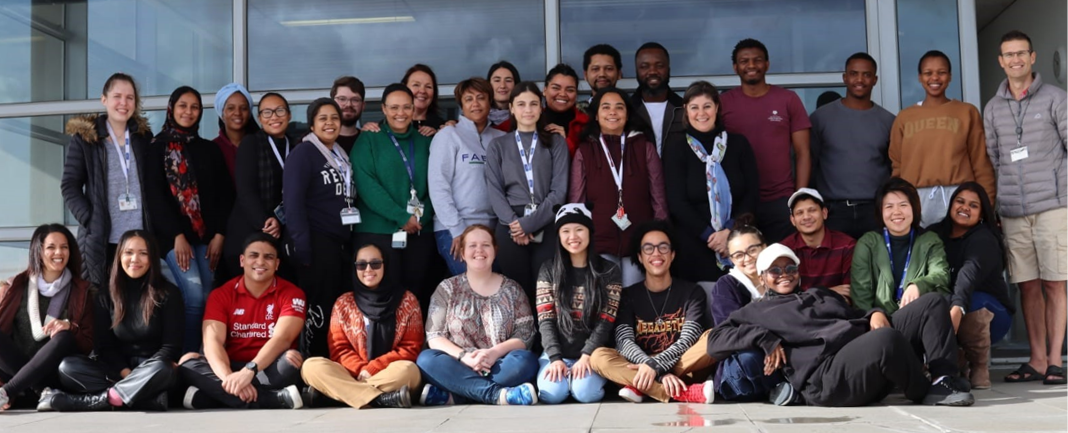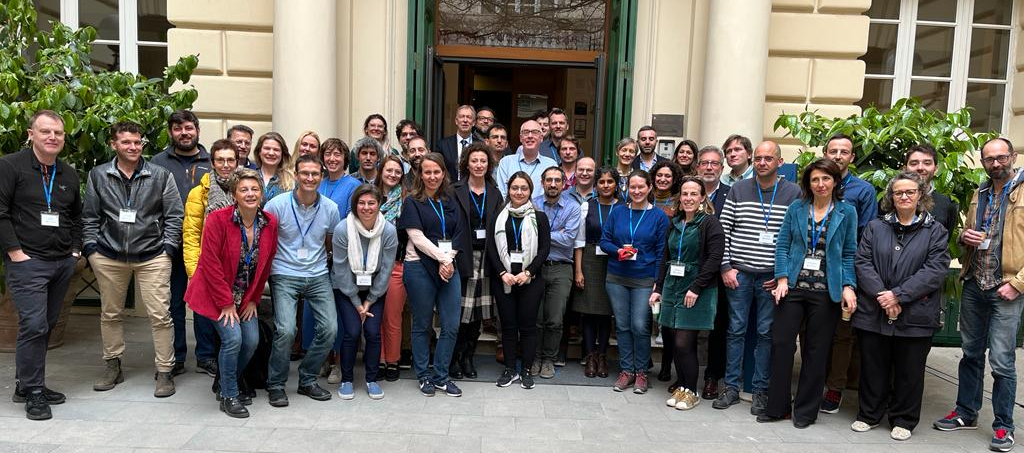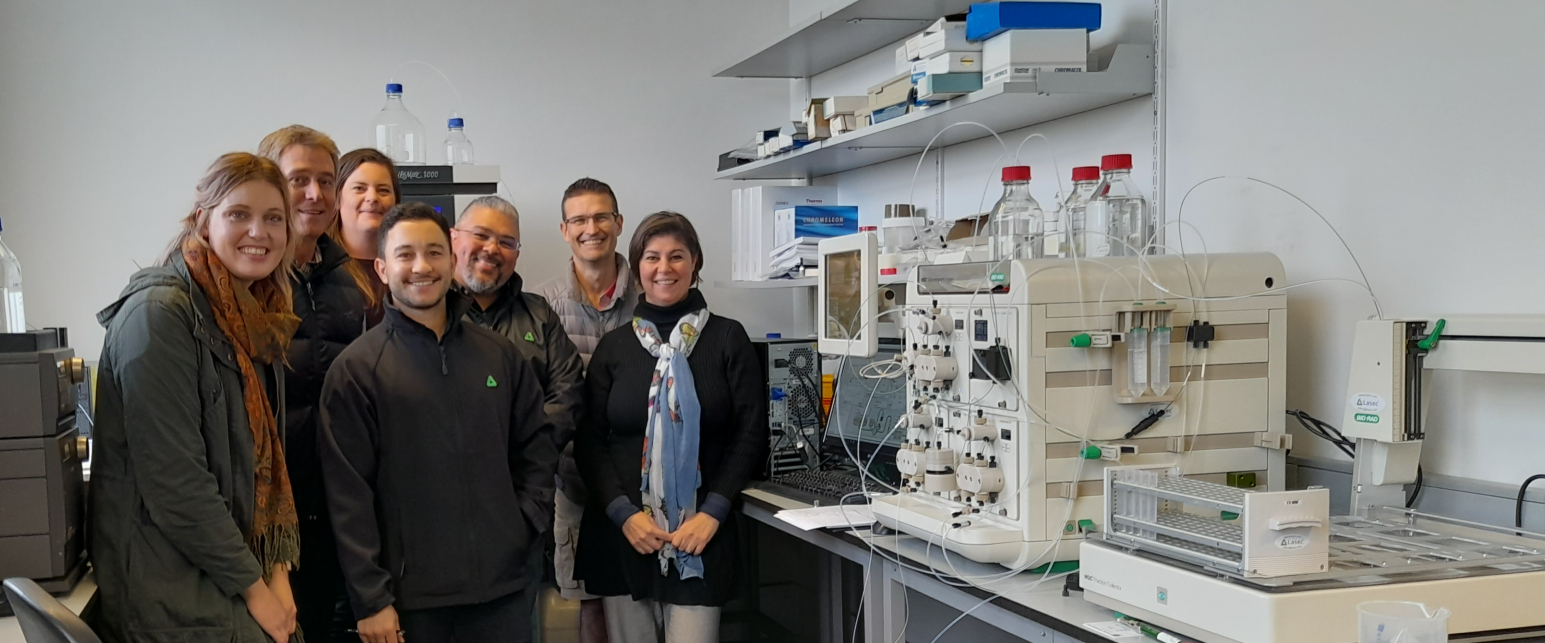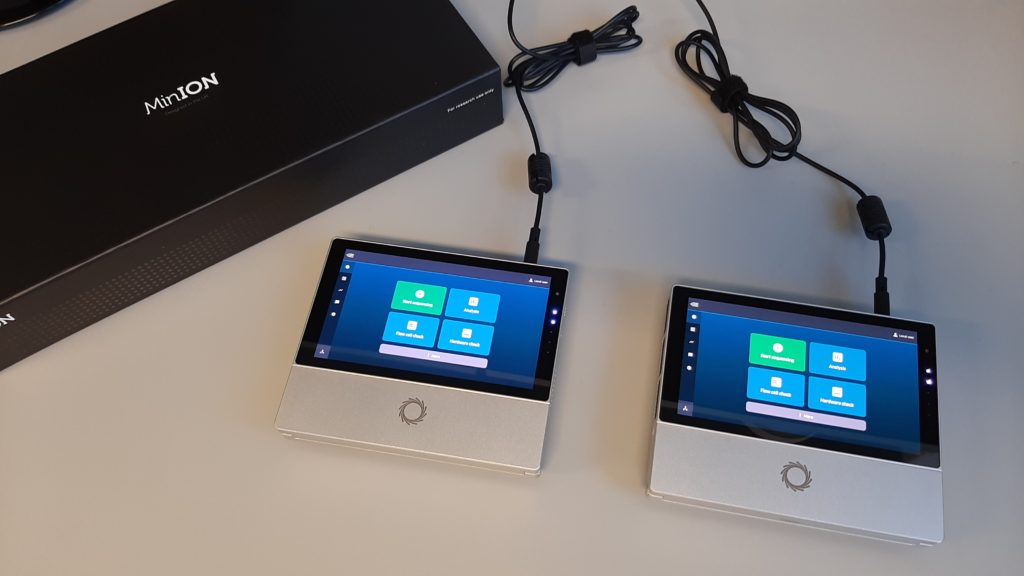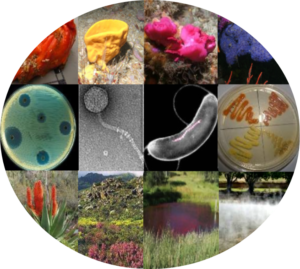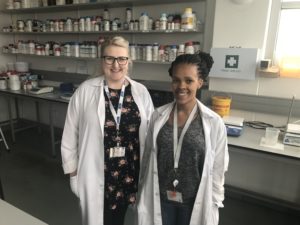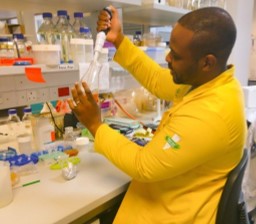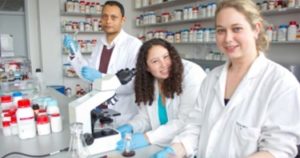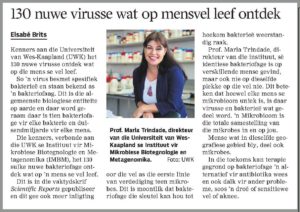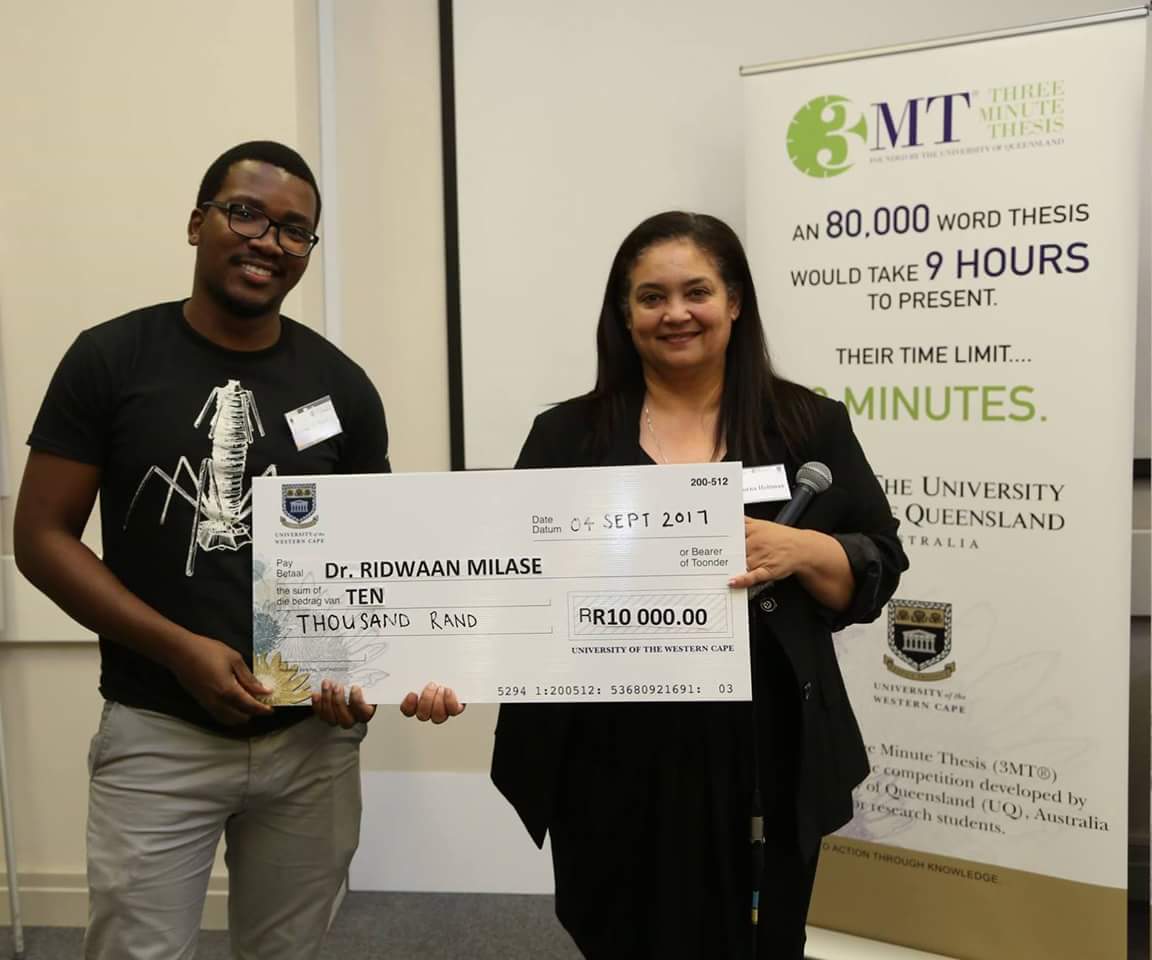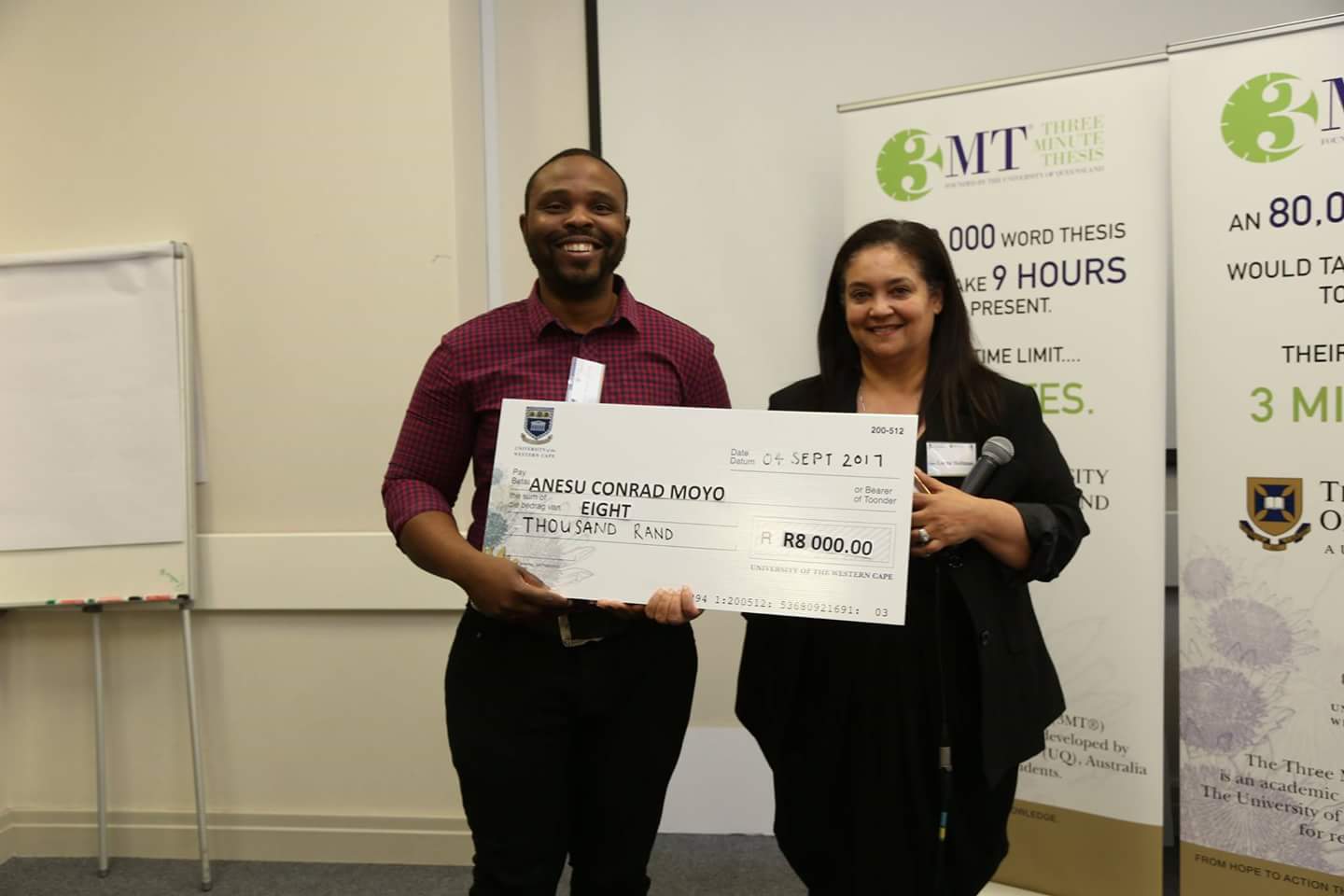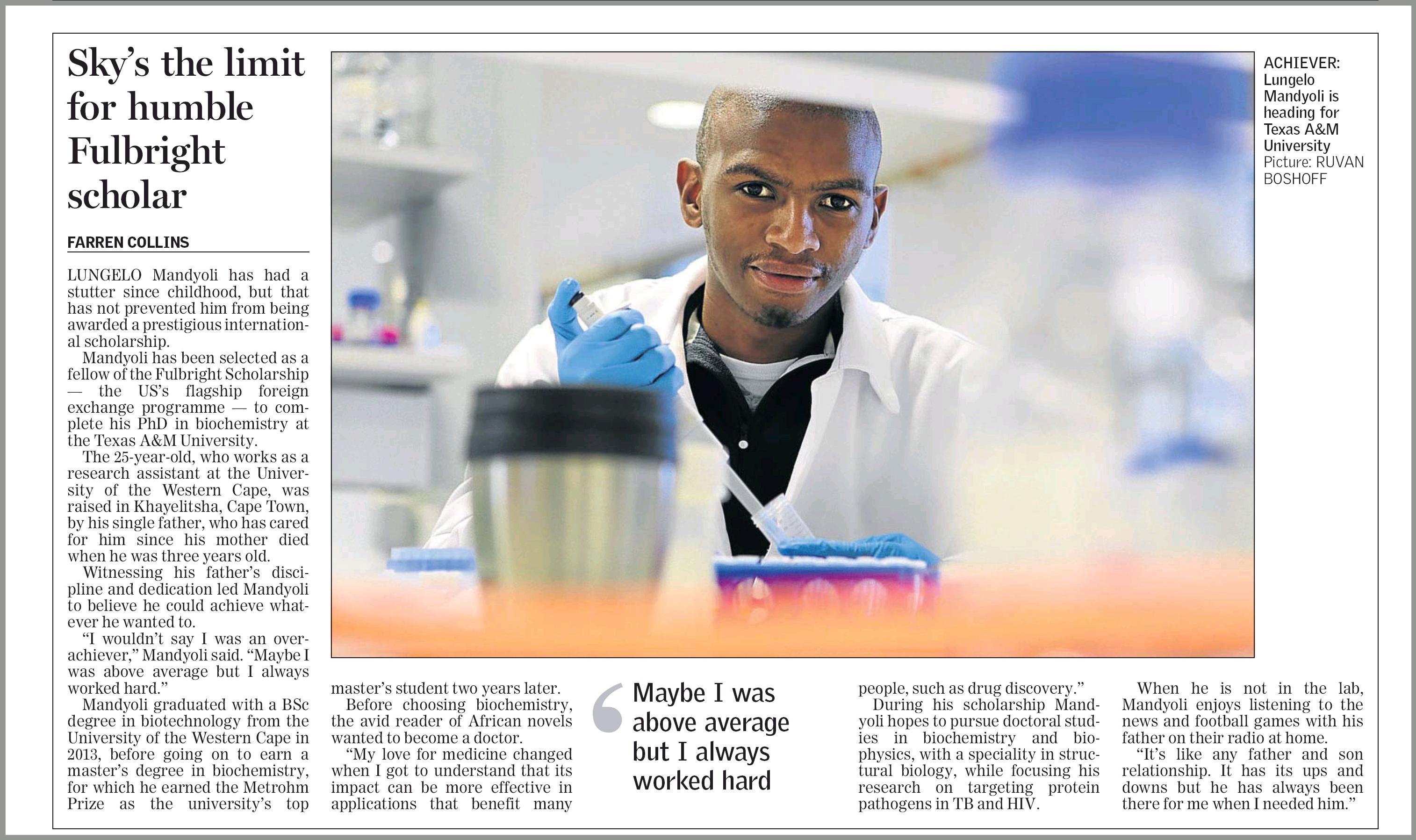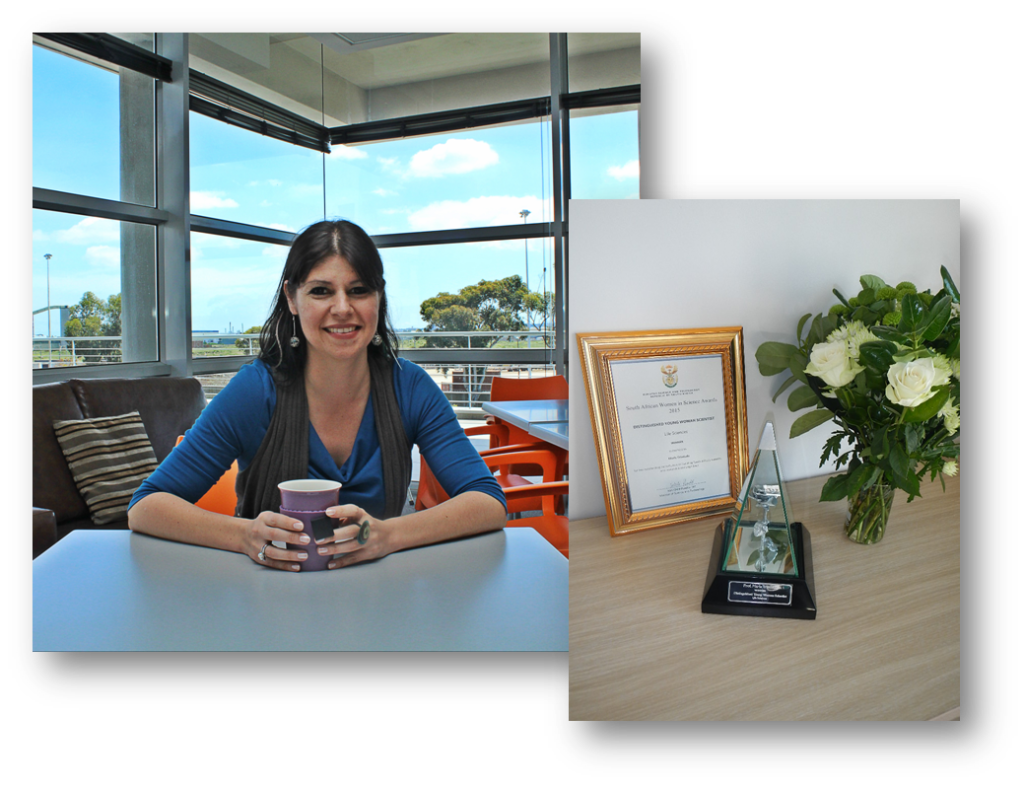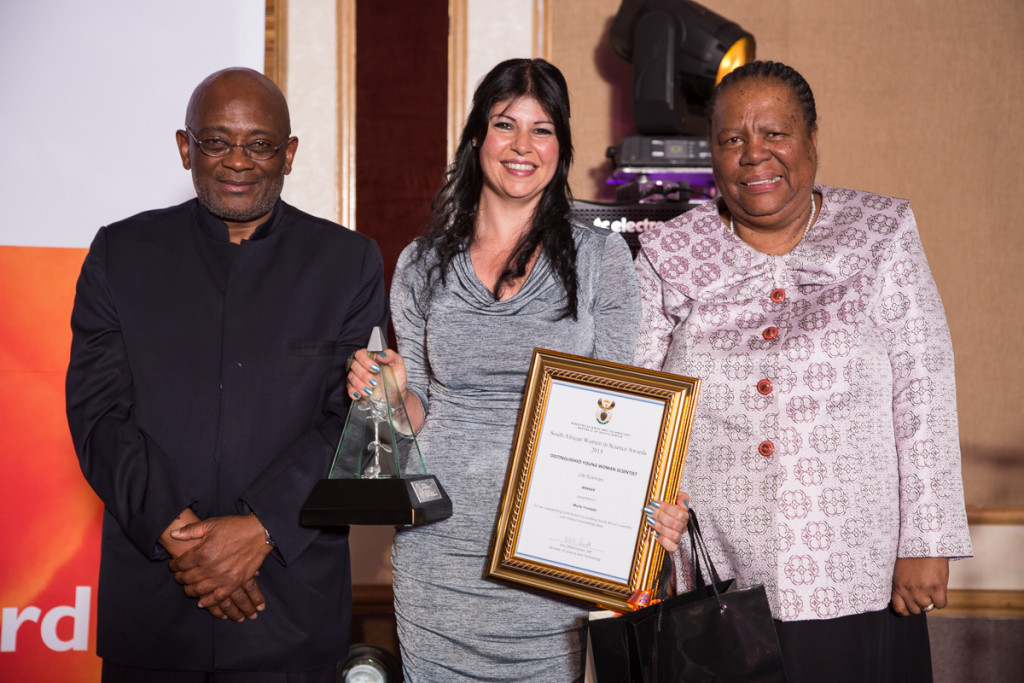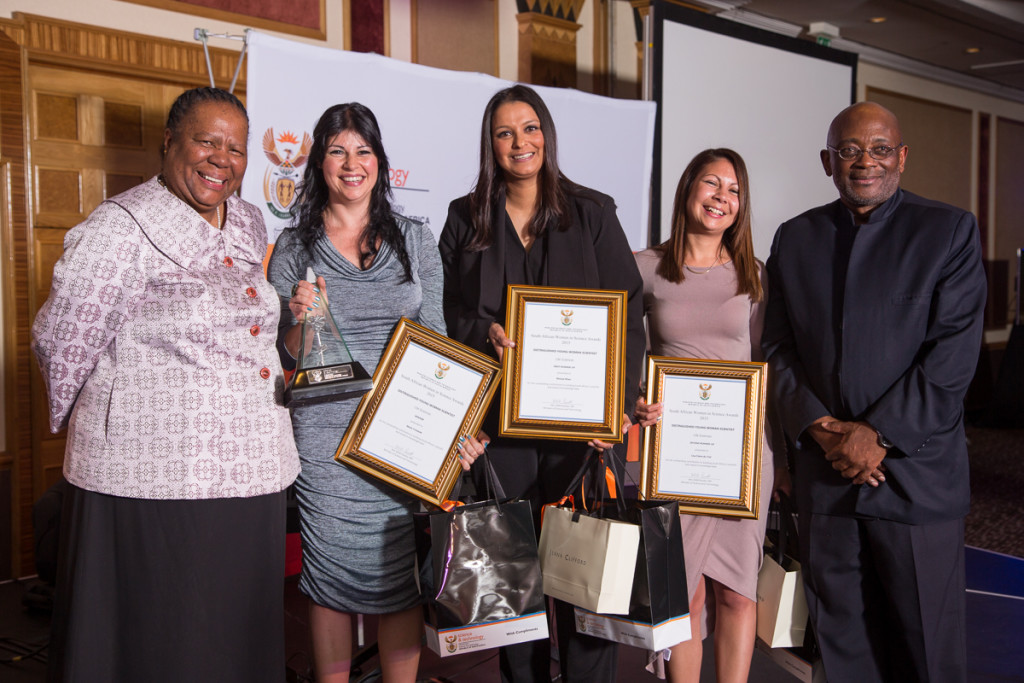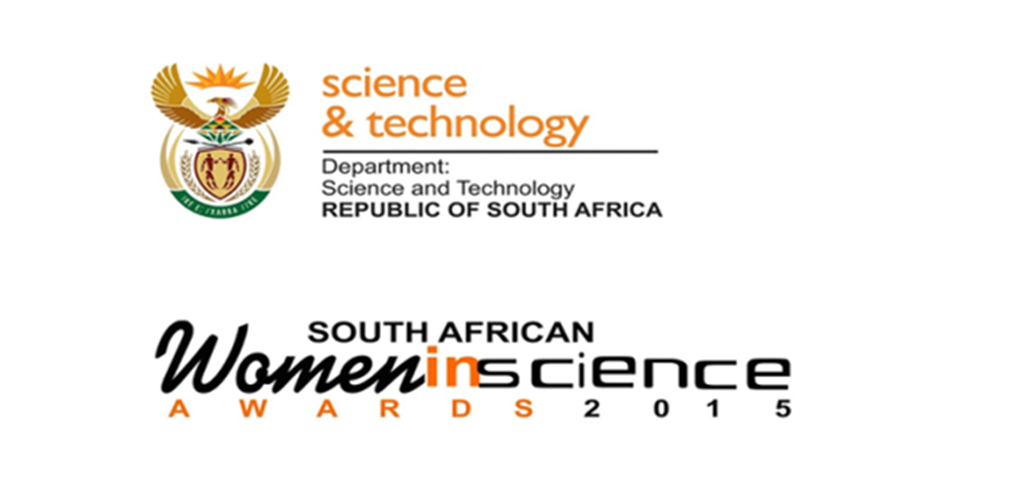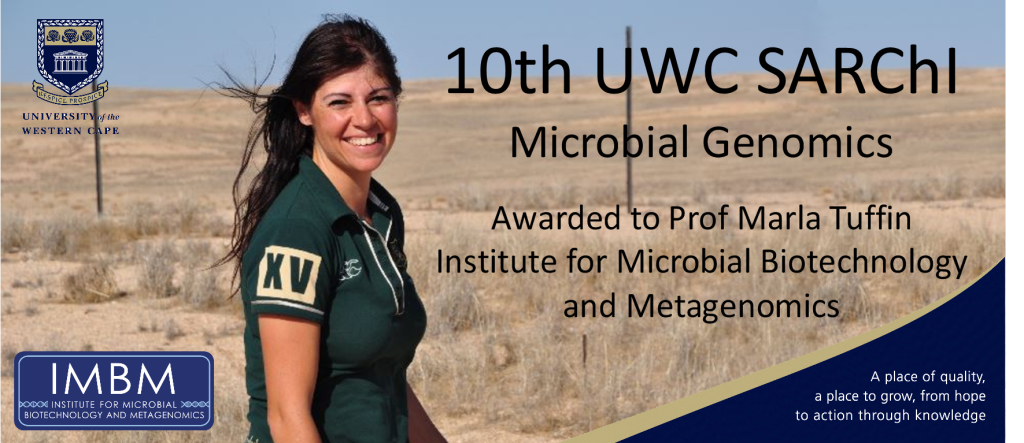1 June 2024, the official start of an exciting multi-national Green ERA-Hub project, AMD-Gas in maize.
The three-year project “Harnessing African Microbial Diversity to mitigate Green House Gas emissions in maize production” is coordinated by the IMBM (UWC) and includes five international partners: Prof Peter Dörsch (Faculty of Environmental Sciences and Resource Management, Norwegian University of Life Sciences), Prof Michele Perazzolli (Center Agriculture Food Environment, University of Trento), Prof Concepción Calvo (Department of Microbiology, University of Granada) and Prof Christopher Ngosong (Agronomic and Applied Molecular Sciences, University of Buea). The IMBM investigators include Profs Bronwyn McCullough and Marla Trindade, Dr Lonnie van Zyl and Mr Kyle Meyer as Magister student.
One of the first activities of the project was the visit of Prof Dörsch and Niklas Wickander, a PhD student on the project, to the IMBM. The visit focused on the sampling techniques that will be employed to capture GHG emission in the field trials that are planned for 2024 and 2025.
The Green ERA-Hub (GEH), is a coordination and support action of the European Commission under the Horizon Europe Framework Programme. The programme coordinates national and international research programmes on Agrifood and Biotechnology.

IMBM joins four-year, EU funded (Horizon 2020) program BlueRemediomics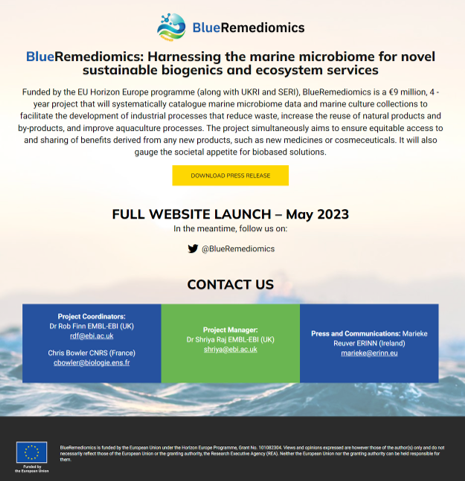 https://blueremediomics.eu/
https://blueremediomics.eu/
Prof. Marla Trindade and Dr. Lonnie van Zyl visited Naples, Italy for the kick off meeting of BlueRemediomics, a four year long EU funded (€9 million) program involving 23 partners including EMBL, EMBRC and the Tara Ocean Foundation. The goal is to develop novel tools and approaches to explore marine microbiome data, uniting an international consortium of experts that will work on the discovery and production of high value sustainable marine microbiome-based products, processes and services. BlueRemediomics will systematically catalogue marine microbiome data and marine culture collections to facilitate the development of industrial processes that reduce waste, increase the reuse of natural products and by-products, and improve aquaculture processes. We’ll be working with long time collaborators Prof. Donatella de Pascale, Dr. Pietro Tedesco (SZN, Italy) and Prof. Marcel Jaspers (University of Aberdeen) to develop cosmeceuticals and antimicrobial peptides from our microbial collections.
Read more at: tinyurl.com/2ykkbfhp
IMBM acquires a new R1.2 million BIO-RAD NGC protein purification system
On Friday the 29th of June a brand new BIO-RAD NGC Medium-Pressure Liquid Chromatography System was commissioned. The purchase of this equipment was to replace an aging AKTA-FPLC. The new system features high volume pumps (100ml/min) and the ability to monitor several light wavelengths at the same time providing the ability to scale up production of not only proteins and peptides, but where the solvent system allows, small molecules as well.
IMBM gets it’s second Oxford Nanopore Technologies sequencer
Following the purchase of an Oxford Nanopore Technologies (ONT) sequencer in late 2021 to augment and perhaps eventually replace our short read capability, IMBM has acquired a second ONT sequencer as part of a DIPLOMICS (https://www.diplomics.org.za/) initiative to get next generation sequencing into the hands of undergraduate and postgraduate students. The initiative involves several laboratories across South Africa including IMBM/UWC SCGP, CPGR (https://www.cpgr.org.za/), CAF (tinyurl.com/yarrd64m), SAIAB-AGL (https://www.saiab.ac.za/), UGS-NGS Unit, SAMRC Genomics Lab (tinyurl.com/2p882wcw), ARC-BTP (tinyurl.com/4du7uxhz) and CenGen (https://cengen.co.za/) and is aimed at training the next generation of researchers on the latest technology platforms.
The IMBM microbial collection awarded as one of the seven core biobanks of the Biodiversity Biobanks South Africa initiative
The Biobanks South Africa (BBSA) is an initiative of the South African Department of Science and Innovation (DSI) South African Research Infrastructure Roadmap https://bbsa.org.za/. It was actioned in 2021 and aims to formalise the network of biodiversity biobanks in South Africa. The IMBM was selected as one of the seven core biobanks.
The IMBM is well known for its research in the fields of microbial biotechnology, bioactive discovery and microbial ecology. As part of this research, the IMBM has established a diverse microbial collection ranging from extreme to indigenous environments including South African marine, and medicinal fynbos amongst others. The collection includes over 3900 strains as well as metagenomic libraries and environmental DNA preparations generated from these unique environments. The genomes from these isolates or metagenomes are largely unexplored, and therefore harbour great potential for the discovery of novel, high-value natural compounds for product development. Selected microbial strains from the different environments will be available to external researchers via the IMBM Biobank. The Biobank will provide an opportunity for national and international interested parties to access some of South Africa’s unique microbial biodiversity for academic, as well as research and innovation purposes. Through the initiative the IMBM aims to promote scientific research, discovery, and development of high-value products, processes and services for application in a range of industries. Initially the IMBM Biobank will only host IMBM strains but once established, it will be available to host microbial strains from other South African researchers.
As a consortium member of the BBSA, the IMBM Biobank is a member to the Global Genome Biodiversity Network (GGBN). The membership provides the IMBM with the opportunity to showcase the microbial collection internationally and, in this way, increase the use of the IMBM Biobank and the exploration of a resource that may qualify as the South Africa’s richest biodiversity resource. It is this resource that is the most likely to meet the South African Bioeconomy Strategy (BES) criteria for the sustainable utilisation of bio-resources. For more information on the IMBM’s focus on the South Africa Bioeconomy see the “Focus on the Bioeconomy” tab on the IMBM website.
For enquiries kindly contact IMBM Research and Innovation Manager, Dr Anita Burger (alburger@uwc.ac.za) or the IMBM Biobank Technical officer, Ms Stephanie Lawrence (slawrence@uwc.ac.za).
The Biobank was also featured here recently: http://tinyurl.com/5b7e6sd9
https://www.dailymaverick.co.za/opinionista/2019-08-09-celebrating-women-is-needed-to-change-gendered-institutional-cultures/
IMBM students win OneBio competition !
Postgraduate students at the IMBM were four of the seven “budding biotech innovators” selected for OneBio’s (https://www.onebio.africa/) first mini incubation programme. OneBio is Africa’s first Biotechnology business incubator and designed this programme in conjunction with the University of the Western Cape. The teams participated in a week-long programme from 20 October to 2 November 2018, during which they were introduced to the fundamentals of taking a biotechnology concept to market and be provided with insights into the frontiers of this particular industry.
The highlight of the week was a Pitching Event, held at the Cape Innovation and Technology Initiative in Woodstock, Cape Town. The event offered the teams an opportunity to present their business concepts to a panel of judges from government and industry, competing for laboratory services to the value of R50 000 from the Centre for Proteomics and Genomics Research (CPGR), and a three-month residency with CPGR/OneBio to further develop the winning idea and business model.
The competition was won by Kirsty Botha and Kanyisa Ndata (IMBM) with their business concept, AsterChem. The concept proposes to make THC-free cannabinoid products, including Heli-CBG oil and a Heli-vape pen, produced from the South African plant Helichrysum umbraculigerum. This will provide a safe and sustainable source of cannabinoids to the South African market. Metabolic profiling will be employed to ensure that every batch has a similar chemical composition.
The second prize was awarded to Anesu Moyo (IMBM) with his concept, HaloPhyle. The concept is based on a technology in which industrial reject brine is used to produce high-value carotenoids.
Although not awarded a prize, the business concept by Katrien King, Danielle Leukes and Dr. Randall Fisher (IMBM) raised a lot of interest. Their concept, A-Grow, aims to produce a customised biofertilizer containing a unique mix of microorganisms, plant growth promoting substances and soil-and-plant immunising bacteriophages. Phage therapy is a safe and environmentally-friendly “cutting-edge technology” alternative to conventional pesticide treatments.
https://www.uwc.ac.za/News/Pages/UWC-students-working–bio-entrepreneurship-wonders.aspx
SAFM interview with Prof. Trindade describing the IMBM study looking at bacteriophages on human skin
Post-graduate positions available at IMBM
From 1 April 2018
The Institute for Microbial Biotechnology and Metagenomics (IMBM) is a leading research unit based within the Department of Biotechnology at the University of the Western Cape (UWC). The Institute is a global competitor in microbial biotechnology and metagenomics, and is committed to excellence in research and in the training of future research leaders. Its research encompasses a number of disciplines including microbiology, (meta)genomics, molecular biology, enzymology and bioinformatics, and employs culture-based approaches as well as cutting edge ”omics” strategies to study microbiomes, and identify novel biosynthetic gene clusters and metabolites. The Institute focuses on the research and development of novel, high-value natural products for the pharmaceutical, cosmeceutical, food & beverage and agricultural industries, as well as products for industrial processes.
Projects available for MSc or PhD studies
Novel Marine Drugs through (meta)Genomics
The South African coast harbors high levels of marine species endemism. This project involves the isolation of biosynthetic gene clusters encoding novel bioactive compounds from prokaryotes associated with marine invertebrates and sediments. The approaches employed are aimed to overcome two of the major bottlenecks which hinder the discovery and development of pharmacological drug compounds.
Metagenomic Mining in Extreme Environments
A Malawian hot spring metagenome has been sequenced. There are several near complete genomes assembled which represent novel species. One of the aims will be to describe these new species and identify characteristics that could inform on their adaptation to the thermophilic environment which they inhabit. The data will also be analysed for the isolation of novel biocatalysts or enzymes which may have biotechnological application.
BlueSkies Metagenomics
The absence of an appropriate biocatalyst has been an impeding factor in many biotechnologies, and thus there is an urgent need for biotechnology innovation. Metagenomics has for almost two decades promised to deliver these biocatalysts, but due to several limitations it has not achieved all that it promised to. We have shown the proof of concept for a highly innovative, novel and powerful technology to take metagenomics to a new level, which represents a paradigm shift in the way that functional metagenomic screening is conducted. The further development of this technology innovation will be the focus of this project, and is expected to result in accelerated discovery of novel enzymes, bioactivities and organisms with enormous commercializable potential in a number of (bio)technology sectors.
Novel microbial surfactants as natural speciality chemicals for commercial application
Surfactants are amphipathic molecules with both hydrophilic and hydrophobic moieties that partition preferentially at the interface between fluid phases such as oil/water or air/water interfaces. Such characteristics confer excellent detergency, emulsifying, foaming, and dispersing traits, which makes surfactants some of the most versatile process chemicals. Synthetic surfactants; however, are increasingly considered as an environmental risk and biosurfactants (microbially produced surface-active compounds), which are biodegradable and generally considered environmentally friendly, have increasingly gathered a lot of interest as potential alternatives. The IMBM is in the process of developing a portfolio of biosurfactants for use in a variety of industrial processes. The project involves the isolation and characterisation (chemical, structural and performance) of novel biosurfactants, as well as the upscaling of biosurfactant production.
Minimum requirements:
For MSc: BSc Hons with a minimum average score of 60% and a major in either Microbiology, Biotechnology, Biochemistry or an equivalent qualification;
For PhD: MSc in Microbiology, Biotechnology, Biochemisty or an equivalent qualification.
Additional requirements:
Experience and skills in molecular biology techniques, method development and good laboratory practice. Responsibility, reliability, good problem solving, time management, communication (written and verbal) and interpersonal skills, as well as computer literacy are absolute requirements. Experience in extraction, isolation and structural analysis technologies is a major advantage
Contact:
To apply or for enquiries, contact Dr Anita Burger, Research and Innovation Manager, IMBM by email (alburger@uwc.ac.za) or telephonically (021 959 2083). Applications should be submitted electronically and include a letter of motivation, abstract from your Hons research project, a CV, a certified copy of the highest degree, and the contact details of three references. The due date for applications is 16 March 2018.
IMBM students reign supreme at
3MT® challenge !
Two of IMBM’s PhD students walked away with the first and second prizes at the “3 minute thesis” challenge hosted by the School of Postgraduate Studies at UWC. The 3MT is an academic competition, originally founded by the University of Queensland, that challenges PhD candidates to describe their research within three minutes to a general audience. 3MT celebrates the discoveries made by research students and encourages you to communicate the importance of your research to the broader community.
The first prize winner was Ridwaan Milase for his work on using phages to treat American foulbrood disease in honeybees and the second prize went to Anesu Moyo for his work on engineering bacterial strains for pigment production to speed up evaporation in brine ponds. Well done guys !! You’ve made IMBM proud.
IMBM Intern Lungelo Mandyoli receives
Fulbright scholarship
IMBM awarded NRF NEP grant towards development of a single cell genomics platform.
IMBM has been awarded a National Equipment Program (NEP) grant to the value of R7.6 million towards the purchase of a Becton Dickson FACS Aria III flow cytometer with an automatic cell deposition unit (96-384 well sorting). The combination of flow cytometry and next generation sequencing using the Illumina MiSeq (IMBM NGS sequencing service) will enable single cell genomics studies. This type of technical platform is not currently available in South Africa, making the combination of these two instruments a first for the country. The service will also be open to be used for the usual suite of mammalian cell culture related assays and sorting which can be performed with this cytometer. The service should be up and running towards the middle of 2017, and we look forward to many exciting results from the platform ! Dr. Walter Nevondo, recently appointed as lecturer in IMBM, will be responsible for management of the platform and all inquiries may be directed at him.
IMBM’s latest project: OCEAN MEDICINES
“Ocean Medicines is a network of academic, research centres and SMEs across Europe, with proven experience in higher education, training and endowed with state-of-the art scientific and technical expertise and infrastructures.
Our aim is to establish a network of collaboration and knowledge-exchange between industrial and academic partners to further develop lead compounds from marine microorganisms having anticancer or anti-infective effects that have already been identified by the consortium. To achieve this goal a mobility programme will be set up to prepare a new generation of marine biodiscovery scientists that will be trained on how to isolate compounds from bioactive bacteria/microalgae and take these through to semi-industrial scale-up for further development and toxicity testing at the pre-clinical level. The Ocean Medicines programme also considers commercialization, innovation and entrepreneurship activities including how to start a new business and how to favour an industrial career to seconded researchers. We are confident that the establishment of this international research network, with its synergistic effects, will significantly contribute to advance all of the involved labs to the top level in the field of marine drug discovery.”
———————————————————-
IMBM is proud to announce that its Director, Prof. Marla Trindade, won the Department of Science and Technology’s Women in Science award in the ‘Distinguished Young Women Scientist – Life Sciences’ category, announced at the awards ceremony on 13 August 2015.
Award ceremony video
567 Cape Talk interview with Prof. Trindade

Twenty-four women, including Prof. Marla Trindade, from various science-related fields have been announced as finalists in the 2015 South African Women in Science Awards.
The awards, which are organised and hosted by the Department of Science and Technology, reward women scientists and researchers, and profiles them as role models for younger women.
This year’s award theme, tagged “Science for a sustainable future”, looks at the contribution that has been made by women researchers towards the achievement of some of the UN’s Millennium Development Goals.
The finalists range from students to established professors who been nominated in four categories: Distinguished Women Scientists, Distinguished Young Women Scientists, Fellowships (for doctoral and masters students) and the TATA Africa Scholarships for Women in Science, Engineering and Technology (doctoral and masters).
The awards ceremony will be held this Thursday, 13th August.
Meet the finalists in the videos below:
DST women in science
———————————————————–
The Institute for Microbial Biotechnology and Metagenomics was established in 2007, and is led by Professor Marla Trindade as the Director. Recognised as one of the leading research units at UWC, IMBM forms part of the Department of Biotechnology. IMBM is committed to being a globally competitive research institute through excellence in research at the highest level.
IMBM is accommodated in the Life Sciences Building, providing state-of-the-art research facilities and equipment. In 2011 we launched the Next Generation Sequencing Facility, designed to provide a regional and national high throughput sequencing service. The platform, managed by Dr. Bronwyn Kirby, boasts 2 sequencers (Roche GS Junior and an Illumina MiSeq), a Lightcycler and Bioanalyser. This platform is the first of its kind in the Western Cape, and aims to make high throughput sequencing accessible and affordable to academic research laboratories.
The IMBM team encompasses more than 45 research, administrative and technical staff. The Principal Investigators leading the research activities are Prof. Marla Tuffin and Dr. Bronwyn Kirby. In addition, Dr. Heide Goodman and Mr. Lonnie van Zyl assist in all aspects of Institute management and administration. The group currently supports a large post-graduate contingent comprising 5 Honours students, 12 Masters, 6 PhD, 2 Post-Doctoral researchers, and 7 technical and support staff.
The research interests within the Institute include Environmental and Plant Microbiology, Metagenomics, Applied Genomics, Nanotechnology, Marine Biotechnology, Enzymology and Structural Biology. IMBM researchers employ and develop modern and leading-edge technologies for metagenomic gene discovery and molecular ecology research. We have extensive skill is in the cloning, expression, and recovery of heterologous genes, and the technology and skill to conduct detailed physical and functional characterization of novel enzymes. We have accumulated an extensive collection of microbial isolates (3000+ marine sponge isolates, 300+ thermophilic bacteria, 100 psychrotrophic bacteria, 100 actinomycetes and several extremophilic bacteriophages), metagenomic libraries and environmental DNA preparations. These materials constitute a highly valuable resource for the identification of novel genes, metabolic pathways and secondary metabolites. With the Proteomics and Sequencing facilities within the Department, we are ideally positioned for “omics” research, and are involved in the comparative assessment of microbial growth, gene expression, engineered strains and much more.
Please contact Prof. Marla Trindade at ituffin@uwc.ac.za.

